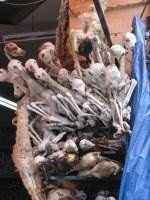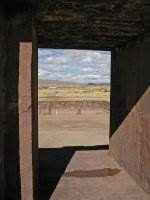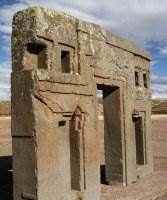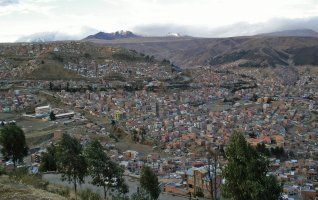| Leaving Peru we drove across the boarder into Bolivia and into the town of Copacabana. This is the original Copacabana which the famous beach in Rio de Janeiro actually took its name from (the Brazilians will openly admit this too!).
This little town is famous in Bolivia for the blessing of cars. When a family gets a new (or new to them in most cases) car they drive it to this town on a Sunday and park them up outside the church. They then decorate them with flowers and religious icons, empty beer on the ground around the vehicle and wait for the priest to come out from the church and bless their family and the car. Truly an extraordinary sight - and it may even work as they have few road accidents…!!!
|
| Leaving Copacabana we caught a catamaran across Lake Titicaca to the sacred ‘Island of the Sun’. Here we took a ride on a reed boat before climbing to the top of the island where we took part in an Inca ritual and were blessed for safe travel. I'm not sure how successful the ritual was, as on our crossing from Sun Island back to the mainland we encountered the largest hail stones and choppy water. Paddy had chance to enjoy a ride on a Polar Bear size reed boat too! |
| We eventually hit land to the north east of Lake Titicaca and drove towards La Paz, which is the world’s highest metropolis (11,910 feet above see level) La Paz is the political capital of Bolivia where the parliament is located (the official capital is Sucre which has very little other than the official title of capital).
La Paz is a huge city located in a crater. Being in the high in the Andes mountains and not far off Lake Titicaca lake it gets cold, so the richer the inhabitants the further down the hillside they live as the climate is warmer. When we arrived in La Paz the sun had already set. As we drove across the top of the canyon a beautiful sight met us as all of the lights in the valley below lit up.
Towards the bottom of the city is a special area called Moon Valley. The place got its name because the landscape resembles the surface of the moon. Water, wind and many thousands years of erosion has created this amazing landscape.
Our coach struggled to drive the steep narrow streets to show us around the well-preserved colonial old town and we ended up exploring the witches' market on foot. Here they sell various "interesting" items. If it's dried frogs, Bolivian armadillos, ceramic figures of naked couples or dried llama fetuses that you're after, you've come to the right place. Here's what your purchase is used for:
- Llama foetus (dried): To protect the house. An estimated 99% of Bolivian families have a dried llama foetus thrown under the foundations of their house for luck.
- Llama foetus (burnt on a plate of sweets and herbs): To ensure luck for a new business venture.
- Dried frogs: For money. If you stick a cigarette in your frog's mouth, your chances of striking it rich will increase.
- Bolivian armadillos: Stick one above the entrance to your house, and it will prevent thieves from entering.
- Amulette d'amor (ceramic couple embracing): To get yourself hitched.
- Naked ceramic couples: To improve the sex life, rectify impotency, and increase fertility.
|
| We visited the archaeological site of Tiahuanaco (Tiwanaku), an ancient city near the south shore of Lake Titicaca, which once thrived as the most important polity in Andean South America. It is believed to be the capital of a pre-Incan civilisation. On returning back to La Paz we were able to see the city in all of its' glory in the daylight. |
| We flew from La Paz, via Santa Cruz into Buenos Aires, Argentina. |
| Back |

















